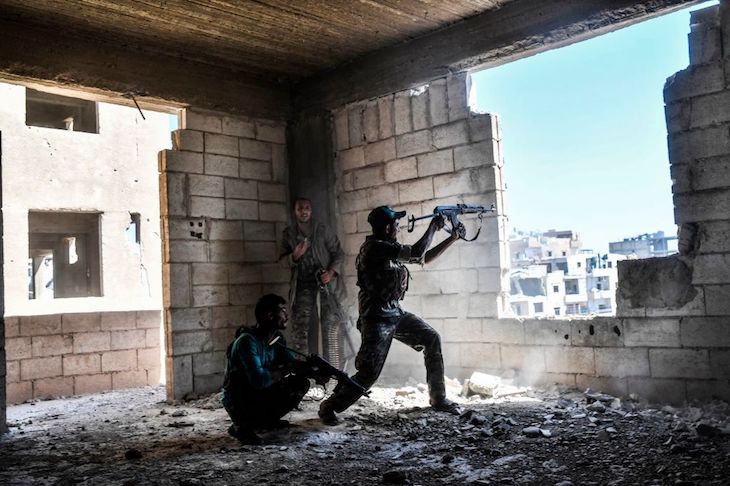After the most intensive street-by-street combat since 1945, Isis’s so-called caliphate is no more. Last weekend, the Iraqi government won what should be the final battle and is now preparing to say that the war is ended. The jihadis still have the odd redoubt — but they have been forced out of Mosul and Raqqa after an intensive coalition campaign led by America and Britain.
Donald Trump is unlikely to emulate his predecessor-but-one by appearing in front of a banner saying ‘Mission Accomplished’. Theresa May probably won’t deliver such a statement either. Indeed, the war against Isis has barely been mentioned by either politician, even though our involvement has been larger than expected. But the world will see the results of it: Mosul and Raqqa, emptied for now of Isis fighters and with life returning as closely to normal as it can in the ruins. Already, an extraordinary two million people have returned home to what they hope will be a sustained peace.
Unfortunately, there is little to inspire any more confidence in that peace now than when Saddam Hussein was removed from power in 2003. Then, as now, the war was won but there was no convincing strategy to stabilise the country afterwards. This time, British forces were given a very narrow mission: the ‘defeat’ of Isis, which was a euphemism for killing its fighters. But what next? Nowhere in the British mandate does the word ‘stabilisation’ occur, yet this is precisely what’s needed now. When the fighting stops for good, the real challenge begins.
In Raqqa, for example, the insurgents were not routed. They were bussed out of the city, allowed to take their slaves and munitions with them, and granted safe passage over the border to Iraq. When Syrian rebels offered similar evacuation deals to jihadis in Manbij and Tabqa, the coalition forces said they wanted nothing to do with such collusion, and that they reserved the right to bomb the buses as they left. But the coalition is not denying astonishing reports this week that it was actively involved in arranging the safe passage of Isis fighters from Raqqa. This might be an easy way to hasten the end of the conflict and go home. But it creates the conditions for fresh chaos.
The nucleus for a new Isis insurgency has already been created. And unlike 2003, Britain is not even pretending to help the Iraqi government foster stability. Perhaps this is because, after Britain’s disastrous handling of Basra — where an understaffed British army effectively handed the city to Shi’ite death squads — the UK is not seen as fit to help. It’s a sad reflection of Britain’s strategic shrinkage, the inevitable result of our declining defence budget (and ambitions). Once, we sought to shape the world. Now, we have a bomb-then-go-home approach, demonstrated in Libya, which sank into chaos after the fall of Gaddafi.
The Iraqi army was given training, but for the fairly selfish purposes of the West: to kill Isis troops rather than to hold cities and keep the peace afterwards. As for the coalition, it was a festival of bombing: so many munitions were dropped that even the Americans were starting to run out. Some 97 per cent of land once held by Isis has now been retaken, but by some estimates there was one precision bomb dropped for every square kilometre taken. And most of it was desert. Had more care been taken so that post-Saddam Iraq did not fall apart in the first place, this would not have been needed.
On the Syrian side of the border, the battle remains complex. Bashar al-Assad looks set to stay, thanks to Russian backing. The Syrian Democratic Forces, an anti-Assad group aiming for a federal Syria, now controls about a quarter of the country, including Raqqa. The most it can hope for is that Assad will grant a Kurdish-style autonomy over this area, rather than resume his war.
In Iraq, as the West starts to leave, the Iranians will be only too happy to occupy any vacant space. Iranian fighters played a larger role in the battles for Mosul and Raqqa than the coalition forces like to admit, and Tehran once again looks like the main beneficiary of the peace. It is precisely this — a Shi’ite axis between Baghdad and Tehran — that led to the Sunni insurgency in the first place.
The United Nations estimates that more than 10 million Iraqis require aid of some kind, with more millions still displaced. If Baghdad’s aid is sent mainly to Shi’ites, and the militias try to frustrate the progress of Sunnis returning home, the conditions for a new insurgency will be set. Iraq’s Prime Minister, Haider al-Abadi, is keen for Britain to stay and help his forces hold the ground. It’s a request that’s unlikely to be debated seriously in Britain, let alone granted.
The campaign against Isis was supposed to be a model for responsible international cooperation, in contrast to the often hubristic military adventurism of Blair and Bush. But to leave without offering the stabilisation that the Iraqis have asked for is not responsible. As things stand, we will be lucky if this third Iraq war involving Western forces in as many decades is not followed by a fourth.






Comments